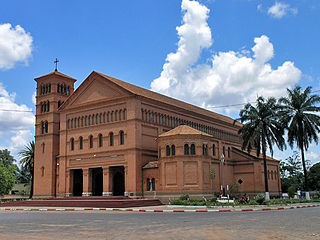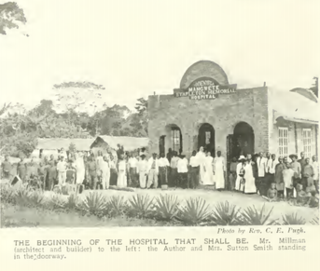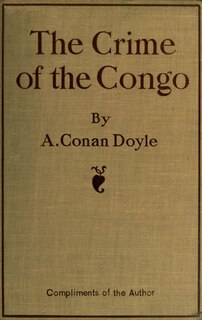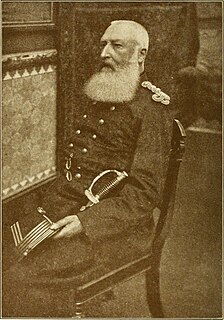Human occupation of Rwanda is thought to have begun shortly after the last ice age. By the 11th century, the inhabitants had organized into a number of kingdoms. In the 19th century, Mwami (king) Rwabugiri of the Kingdom of Rwanda conducted a decades-long process of military conquest and administrative consolidation that resulted in the kingdom coming to control most of what is now Rwanda. The colonial powers, Germany and Belgium, allied with the Rwandan court.

Leopold II was the second King of the Belgians from 1865 to 1909 and, through his own efforts, the owner and absolute ruler of the Congo Free State from 1885 to 1908.

The Belgian Congo was a Belgian colony in Central Africa from 1908 until independence in 1960. The former colony adopted its present name, the Democratic Republic of the Congo (DRC), in 1964.

The Jesuit Refugee Service (JRS) is an international Catholic organisation with a mission to accompany, serve, and advocate on behalf of refugees and other forcibly displaced persons, that they may heal, learn, and determine their own future. Founded in November 1980 as a work of the Society of Jesus, JRS was officially registered on 19 March 2000 in Vatican City as a foundation. The impetus to found JRS came from the then superior general of the Jesuits, Pedro Arrupe, who was inspired to action by the plight of Vietnamese boat people. JRS has programmes in over 50 countries. The areas of work are in the field of education, emergency assistance, health care, livelihoods, reconciliation, and psychosocial support. JRS is also involved in advocacy and human rights work. This involves ensuring that refugees are afforded their full rights as guaranteed by the 1951 Geneva Convention relating to the Status of Refugees and working to strengthen the protection afforded to Internally displaced persons (IDPs). JRS's international headquarters is located in Rome at the Society's General Curia. The International Director is Rev. Thomas H. Smolich SJ.

Fr. Pedro Arrupe,S.J. was a Spanish Basque Jesuit priest who served as the 28th Superior General of the Society of Jesus from 1965 to 1983. He has been called a second founder of the Society as he led the Jesuits in the implementation of the Second Vatican Council, especially with regard to faith that does justice and preferential option for the poor.

Bolenge is a village located in the Democratic Republic of the Congo. It is located exactly where the geographic equator intersects the Congo River, formerly the Zaire River. Henry Morton Stanley reputedly stopped at Bolenge during his epic voyage across central Africa during the 19th century. In 1884 a mission station was established at nearby Wangata by the British Livingstone Inland Mission then moved to Bolenge in 1891 by the American Baptist Missionary Union Baptists. In the 1890s the local missionaries Murphy, Sjoblom and Banks were pioneers in bringing world attention to atrocities by Belgian King Leopold's Congo Free State. This mission was acquired in 1899 by the American protestant church called the Christian Church. Eventually a network of mission stations were established throughout the Equateur province of what was at the time known as the Belgian Congo. Each mission station had a hospital and various schools and other social and economic programs.

Basankusu is a town in Équateur Province, Democratic Republic of the Congo. It is the main town and administrative centre of the Basankusu Territory. In 2004, it had an estimated population of 23,764. It has a gravel airstrip, covered and open markets, a hospital, and three cellphone networks, the first of which was installed in 2006. The town is also known as a centre for bonobo conservation efforts. Despite such developments, most inhabitants live at a subsistence level: hunting, fishing, keeping chickens and keeping a vegetable plot. In 2010, the workers at the local palm plantation would earn an average monthly salary of $40, most others would have much less.

Sima Samar is an Afghan woman's and human rights advocate, activist and a social worker within national and international forums, who served as Minister of Women's Affairs of Afghanistan from December 2001 to 2003. She is currently the Chairperson of the Afghan Independent Human Rights Commission (AIHRC) and, from 2005 to 2009, United Nations Special Rapporteur on the situation of human rights in Sudan. In 2011, she was part of the newly founded Truth and Justice party. In 2012, she was awarded the Right Livelihood Award for "her longstanding and courageous dedication to human rights, especially the rights of women, in one of the most complex and dangerous regions in the world."

Christianity is the majority religion in the Democratic Republic of the Congo. As of 2018, the US State Department reported that roughly 96% of the population are members of Christian denominations, with the remaining less than 5% following other non-Christian religions. According to the 2020 Report on International Religious Freedom, of Christians an estimated 48.1 percent are Protestant, including evangelical Christians and the Church of Jesus Christ on Earth through the Prophet Simon Kimbangu (Kimbanguist), and 47.3 percent Catholic. Other Christian groups include Jehovah’s Witnesses, The Church of Jesus Christ of Latter-day Saints, and the Greek Orthodox Church.
The Roman Catholic Vicariate Apostolic of the Congo, the administrative region covering Catholic mission activity in the Congo area of Central Africa, was by the end of the nineteenth century already fragmented.

The Abir Congo Company was a company that exploited natural rubber in the Congo Free State, the private property of King Leopold II of Belgium. The company was founded with British and Belgian capital and was based in Belgium. By 1898 there were no longer any British shareholders and the Anglo-Belgian India Rubber Company changed its name to the Abir Congo Company and changed its residence for tax purposes to the Free State. The company was granted a large concession in the north of the country and the rights to tax the inhabitants. This tax was taken in the form of rubber obtained from a relatively rare rubber vine. The collection system revolved around a series of trade posts along the two main rivers in the concession. Each post was commanded by a European agent and manned with armed sentries to enforce taxation and punish any rebels.

Christianity is the majority religion of the Democratic Republic of the Congo and is professed by a majority of the population. The number of Christians of all denominations in the Congo is estimated at over 63 million by the Pew Research Center, a figure representing approximately 95.7 percent of the national population or 2.9 percent of the world's Christians. The largest denomination is Roman Catholicism which represents 50 percent of the national population, and is followed by Protestantism and Kimbanguism and other sects. The history of Christianity in the area of the modern-day Congo is closely linked to the history of European colonial expansion.

Yakusu was a mission in the Democratic Republic of the Congo, on the Congo River just west and downstream of Kisangani.

The Congo-Balolo Mission (CBM) was a British Baptist missionary society that was active in the Belgian Congo, the present day Democratic Republic of the Congo, from 1889 to 1915. It was the predecessor of the Regions Beyond Missionary Union (RBMU), established in 1900, which today is called World Team.

Alice Seeley Harris was an English missionary and an early documentary photographer. Her photography helped to expose the human rights abuses in the Congo Free State under the regime of King Leopold II of the Belgians.

The Crime of the Congo is a 1909 book by British writer and physician Sir Arthur Conan Doyle, about human rights abuses in the Congo Free State, a private state established and controlled by the King of the Belgians, Leopold II.

In the period from 1885 to 1908, many well-documented atrocities were perpetrated in the Congo Free State which, at the time, was a colony under the personal rule of King Leopold II of the Belgians. These atrocities were particularly associated with the labour policies used to collect natural rubber for export. Together with epidemic disease, famine, and a falling birth rate caused by these disruptions, the atrocities contributed to a sharp decline in the Congolese population. The magnitude of the population fall over the period is disputed, with modern estimates ranging from 1 million to 15 million deaths.

Dr Ernest Woodward Price MD, FRCSE, DTM&H, OBE was a missionary doctor, orthopaedic surgeon, leprosy specialist and the discoverer of podoconiosis, one of the neglected tropical diseases. A list of his publications is available online.

Congolese nationality law is regulated by the Constitution of the Democratic Republic of the Congo, as amended; the Congolese Nationality Code, and its revisions; the Congolese Civil Code; and various international agreements to which the country is a signatory. These laws determine who is, or is eligible to be, a national of the Democratic Republic of the Congo. The legal means to acquire nationality, formal legal membership in a nation, differ from the domestic relationship of rights and obligations between a national and the nation, known as citizenship. Congolese nationality is typically obtained under the principle of jus soli, i.e. by birth in the Democratic Republic of the Congo, or jus sanguinis, born abroad to parents with Congolese nationality. It can be granted to persons with an affiliation to the country, or to a permanent resident who has lived in the country for a given period of time through naturalization.

In August–November 1976, an outbreak of Ebola virus disease occurred in Zaire. The first recorded case was from Yambuku, a small village in Mongala District, 1,098 kilometres (682 mi) northeast of the capital city of Kinshasa.




















